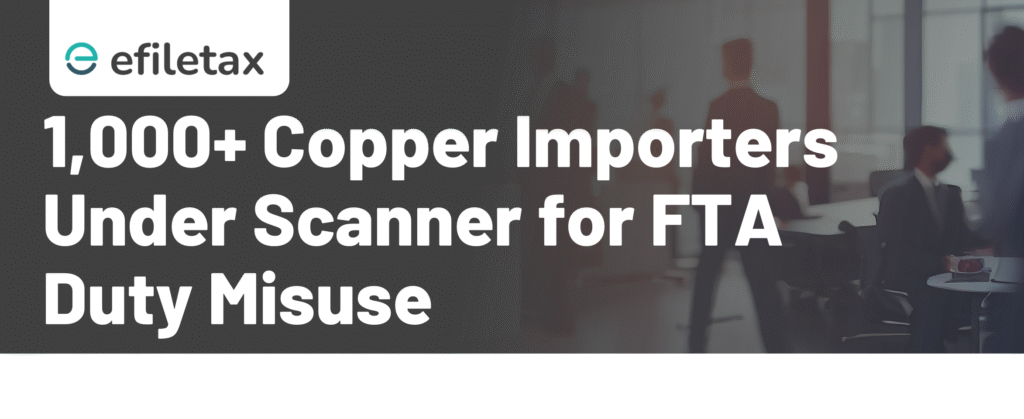
ASEAN FTA Duty Misuse What Copper Importers Need to Know
Over 1,000 copper importers in India are now under the scanner for misusing ASEAN FTA duty exemptions, triggering a wave of investigations and demand notices by Indian Customs. This blog breaks down what went wrong, the legal basis of this crackdown, and how importers can stay compliant.
What Is the ASEAN FTA Duty Benefit?
The ASEAN-India Free Trade Agreement (AIFTA) allows concessional or zero customs duty on eligible goods originating from ASEAN countries (like Malaysia, Indonesia, Vietnam, etc.).
To claim this, importers must submit:
- Certificate of Origin (COO): Form D issued by a recognised authority in the exporting country
- Goods must meet the Rules of Origin (ROO) norms
- Proper value addition must occur in the exporting country
What Went Wrong with Copper Imports?
Key Issues Flagged by Customs:
- Falsified Certificates of Origin
- Goods were not actually “originating” in ASEAN but routed from non-member countries
- Insufficient value addition in exporting country
- Suspicion of circumvention of anti-dumping duties imposed on copper from other nations
Result:
- Over 1,000 importers received demand notices and investigation summons
- Huge liability in terms of duty differentials + penalties + interest
Legal Grounds for Action
Customs actions are based on:
- Section 28 of the Customs Act, 1962 – Recovery of duty not levied or short-levied
- Customs (Administration of Rules of Origin under Trade Agreements) Rules, 2020 (CAROTAR Rules)
- DGFT Notifications on Country of Origin verification
- Anti-dumping duty provisions under Section 9A of the Customs Tariff Act
Compliance Checklist for Importers
To stay compliant and avoid penalties:
- ✔️ Verify authenticity of COO (Form D) before claiming benefits
- ✔️ Ensure the goods meet ROO & minimum value addition norms
- ✔️ Maintain complete supporting documents for 5+ years
- ✔️ Be prepared for Origin Verification Queries from Customs
- ✔️ File declarations under CAROTAR Rules, 2020 correctly
Expert View:
“Many importers blindly rely on the seller’s documents. That’s risky. Under CAROTAR Rules, the Indian importer must verify the origin themselves. Use self-verification tools and request technical value-add info from suppliers.”
— GST & Customs Consultant, Chennai
Summary Table – ASEAN FTA Copper Case
| Issue Detected | Legal Reference | Action Taken by Customs |
|---|---|---|
| Fake COO/Non-origin goods | CAROTAR Rules + Customs Act Sec 28 | Duty recovery & investigation |
| Bypassing anti-dumping | Customs Tariff Act Sec 9A | Duty reassessment |
| No value addition proof | Rules of Origin under AIFTA | Denial of concessional duty |
Summary
Over 1,000 Indian copper importers face customs action for ASEAN FTA duty misuse under CAROTAR Rules and origin violations.
FAQs
Q1. Can customs reject a valid Form D if origin rules are not met?
Yes. Customs can verify origin independently and reject duty benefits if ROO conditions under AIFTA are violated.
Q2. What happens if I already sold the goods?
Duty liability and penalties are still recoverable under Section 28. Interest applies from the date of clearance.
Q3. Is the importer always liable?
Yes, under CAROTAR 2020, the importer is responsible for verifying the origin—not just the exporter.
Final Words
If your business relies on FTA-based duty exemptions, especially under ASEAN FTA, now is the time to review your imports and documentation. Ignorance is no defence — non-compliance can lead to heavy financial and legal consequences.